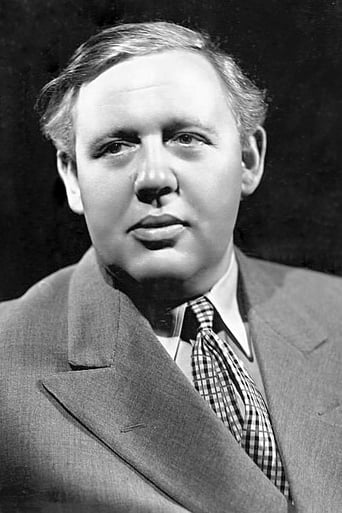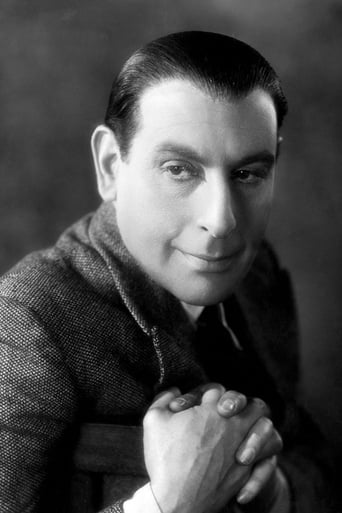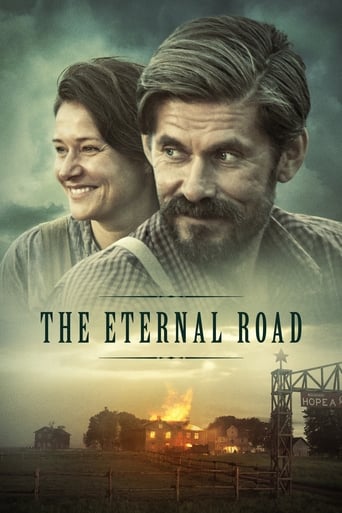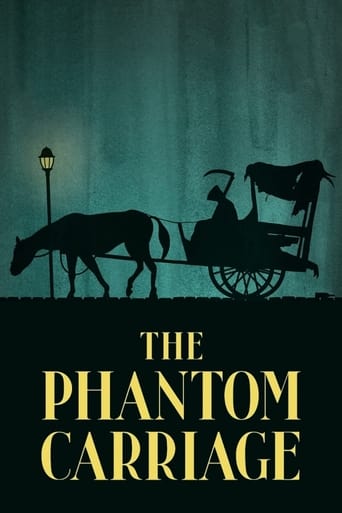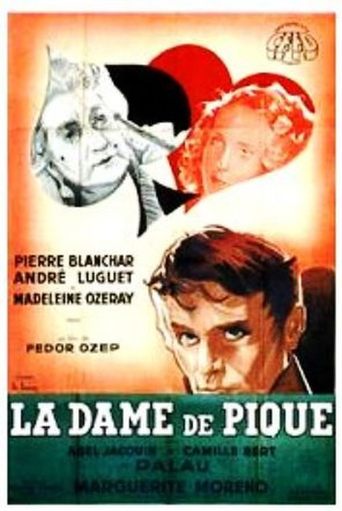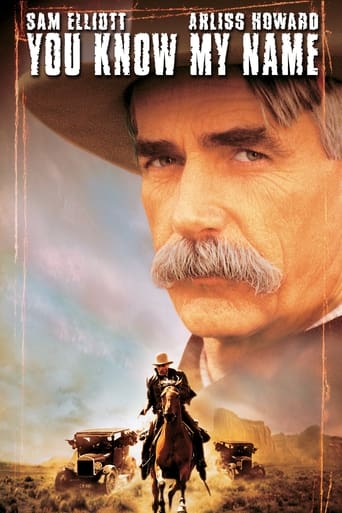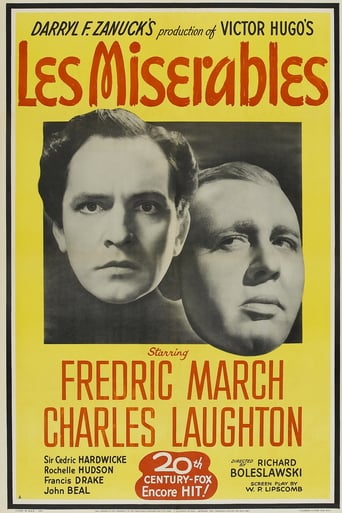
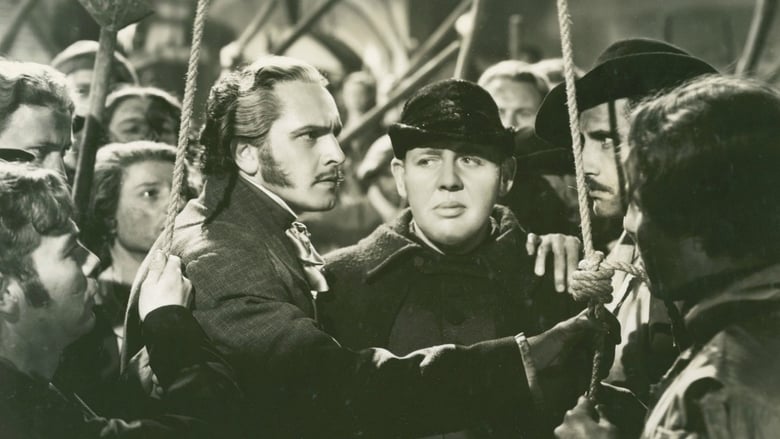
Les Misérables (1935)
In early nineteenth-century France Jean Valjean, an ex-convict who failed to report to parole, is relentlessly pursued over a twenty-year period by Javert, an obsessive policeman.
Watch Trailer
Cast


Similar titles
Reviews
I will never understand why people insist on ruining a perfectly wonderful story by making it into some indecipherable and mostly unwatchable musical. Those who do such should be sentenced to 20 years hard labor. This movie is wonderful, and portrayed the story as Hugo intended, I am sure.There are many versions of Les Misérables. This is definitely one worth watching. If you have ever wondered what the entire story is, read the entire Hugo writing; second best, watch this movie. Charles Laughton is wonderful in his same pudgy sissy/bully role that he usually plays. Frederick March is, indeed, a star.
So stealing a loaf of bread gets you years in a squalid prison, rowing a galley with a thousand other poor souls that never goes anywhere. Some justice. And if you miss a parole appearance, you get a monomaniacal cop named Javert who has no life other than chasing you down. So, if you're like Val Jean, wouldn't you get mean and anti-social too. And when invited out of a storm by a priest, no less, it's only natural that Val Jean looks to steal what he can. But then, a funny thing happens. When the cops bring him back with the stolen goods, the priest gets him off the hook by saying the stolen candlesticks were a gift. It's an act of mercy, something the law has never shown him. Now Val Jean sees that life might be lived in a kinder, gentler way. And when he leaves and comes to the literal and figurative fork-in-the-road, he remembers the words of humane wisdom given him by the priest. Traveling in a new direction, he becomes the good man he has always been, waiting to be brought out. Now, if only he could get that merciless cop off his trail, life would be good.Fine dramatization of Hugo's great plea for social reform in 19th century France. I wonder what our own Depression era audiences saw in the story, given the oppressive conditions of the 1930's. March is compelling as the reborn Val Jean, while Laughton makes for an unforgettably quirky Javert. But I wonder too, what would change if the aristocratically handsome March played Javert, with the very unphotogenic Laughton as Val Jean. That would challenge our comfortable stereotypes and make for a more interesting and humane message. Then too it's unfortunate that someone in production felt the audience wouldn't get the spiritual message without being hit over the head with heavenly choirs and light beams from above. I guess that was done for box-office returns. But too often Hollywood has reduced the profound to the hokey, thereby corrupting the message and turning spirituality into a mere matter of stage craft. Nonetheless, the moral remains a telling one, as relevant now as it was 70 or even 170 years ago. Law exists only on paper, while justiceas they saydwells in the human heart. It is not a truth Javert, the slavish servant of the state, can live with. Hugo was not only a great writer, but a very good man, as well.
To begin with, I doubt that most people realize that Victor Hugo's Les Miserables is not a two hundred to four hundred page novel. It is a thirteen hundred page novel (in English translation as well as the original French). This actually puts it into the same category as those other classic that most people never read: "The Bible" (both testaments together), "Don Quixote", "War and Peace", "Clarissa Harlowe", "The Decline and Fall of the Roman Empire", "The Count of Monte Cristo". Everyone knows stories or chunks of most of these books (except for Richardson's "Clarissa", which is not popular these days due to it's epistolary style). Few read them to get an idea of their full impact. It is sobering to realize that humongous novels by Dickens and Thackeray and George Eliott, like "Bleak House, "Pendennis", or "Middlemarch", are shorter (roughly 800 pages each) than these seven earlier titles that I mention. That means one is more likely to be willing to read "Middlemarch" (a thoughtful but difficult study of provincial life in 1832 England), than "The Count of Monte Cristo" (with it's fast paced and exciting tale of power, greed, and revenge in post-Napoleonic France.In it's full range, "Les Miserables" was a probing attack on the greed and social evil rampant in France from 1815 to 1832 (the beginning of the so-called "July " or Orleans Monarchy. However I warn you that if you read it you will find it annoying after awhile. You will remain sympathetic towards Valjean, protecting little Cosette who he raises as his daughter, and saving Marius (although he would as soon Cosette never saw Marius again). And you will also dislike Javert, his adversary - the perfect police official. But you will find Hugo expounding questionable views on criminals. Not all the poor are criminals, but after reading Hugo one gets the impression that if they aren't they are fools. For all the defects of Louis Phillippe's July Monarchy, it gave France prosperity and peace for nearly two decades. But to Hugo it was a criminal throwback to the barbarism of the Bourbons - France did not need monarchs, it was a republic and a democracy. For most of his life Hugo attacked "royalism" in all its guises in France, culminating in his years in exile in opposition to the Second Empire of Napoleon III (1851 - 1870 - the period that Hugo wrote "Les Misearbles" in). Oddly enough he never really attacks the first Napoleon. Read the chapters on the Battle of Waterloo in "Les Miserables" and it is almost a regrettable valentine to the little Corsican. Interestingly enough, when the Paris Commune burned much private property in 1871 (before being put down by French troops assisted by German troops), Hugo suddenly ceased being so admiring about the lowest level of the poor - after all they burned some of his property too. Trimmed of much of it's literary weight it makes a dandy little over-the-years thriller, and it has been filmed many times. The best one I remember was a French version from 1956 with Jean Gabin as Valjean (and actually he was physically closer to the poor ex convict than March was). But it was three and a half hours long, so I suspect that this one will have to do. It keeps the main threads of the story together, and performances by March, Laughton, Florence Eldritch (as Fantine), and others are excellent. Even Leonid Kinski as one of March's former convict friends gives a chilling little moment just by saying "Hello Jean" in a courtroom. So watch it, the best normal length movie version. And then put aside a month for reading the original novel (and then plan similar time schemes for those other unread classics I just listed - It will occupy you for about a year and a half or so).
In my opinion, this version is far from being the best adaptation of Victor Hugo's classic and marvelous novel; these are my reasons: The Thernardiers, indispensable characters in the story, are relegated in the film to mere incidental figures. Their little son Gavroche does not even appear. Their daughter Eponine appears, but she has nothing to do with them, she is only a friend of Marius, in love with him. Fauchelevent also appears as an incidental character, when Jean Valejan saves him from dying; he does not appear when Valjean and Cosette arrive to the Petit-Picpus convent. The film does not end as the original story. Much better versions are the French ones directed in 1934 by Raymond Bernard, starring Harry Baur as Jean Valjean, and the 1982 directed by Robert Hossein, starring Lino Ventura as Jean Valjean.



